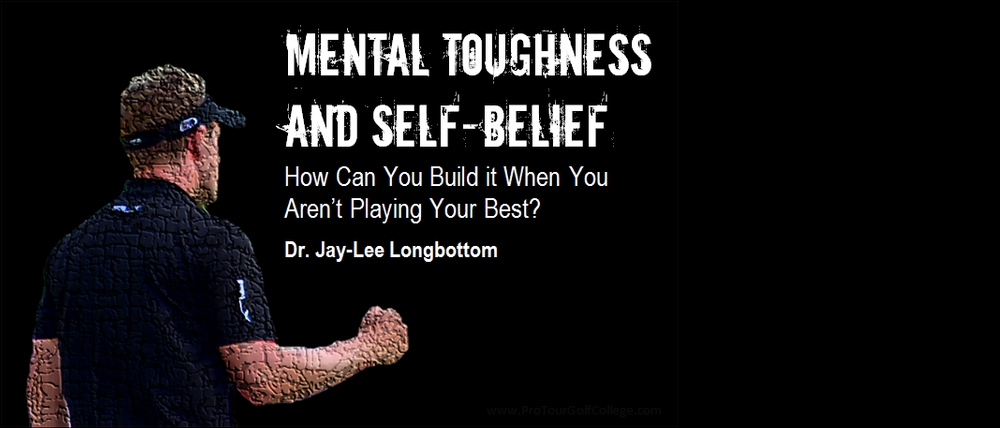There are certain patterns in a player’s performance that characterize a lack of self-belief and mental toughness.
For instance:
- Do you typically start the round off “cold” and settle into a groove after a few holes?
- Do you need to have your swing “just right” before you feel ready to put a good score on the board?
- Do you start to play overly cautious and protect your score once you realize you’re under par or in contention?
If you find yourself in these situations frequently it’s critical you start spending less time on the range and more time on yourself.
To start this process, ask yourself, are you effectively building your self-belief?
One primary item in Jones’ (Jones et al., 2007) mental toughness questionnaire assessing the sub-component self-belief reads,
“Having an unshakeable self-belief as a result of total awareness of how you got to where you are now.”
Many athletes I work with and their families say that this will come with experience.
What they refer to is the experience of winning.
But anyone can achieve this once and chalk it up to luck saying, “I got lucky out there…a few good bounces in the right direction, and some putts dropped.”
But real self-belief and long-term success comes from believing you can replicate high performance over and over and knowing your key ingredients that go into creating top performances.
How well are you analyzing your experiences right now in ways that build your belief regardless of the outcome?
It does not matter how “inexperienced” you may perceive yourself to be, experiences are relative, and the earlier you start to take stock from the events that have lead you to your current status, the faster you will grow and thrive.
Do you know your strengths as a player and how to maximize them in your game? Get to know your most successful moments and most challenging ones and explore in depth what you have learnt about yourself.
Do you understand what inner arrogance is truly about?
Another primary item in Jones’ 2007 measure assessing mental toughness reads, “Having an inner arrogance that makes you believe that you can achieve anything you set your mind to.”
Interestingly, 90% of the athletes who visit me believe that inner arrogance will lead to complacency and feel its better to be overly self-critical, effectively diminishing self-belief.
Many players shy away from using or even thinking of the term arrogance.
Firstly, inner arrogance is simply a “feeling” of self-confidence and trust in your skills, and it’s got nothing to do with an overt display of cockiness to others.
Secondly, complacency comes from the sole assessment of your success in comparison to the competition pack you most closely identify with. Drive and perseverance will be maintained if you look beyond the local crowd, training partner, or teammate for new bench marks of high performance.
Get to know the statistics of the best in the business and don’t just follow suit of the regionally ranked players you often compete with. Start to create self-oriented standards for preparation and conduct on the course.
This will ensure that your self-confidence remains in your control, NOT in the hands of others, and will ensure you don’t get complacent with meeting the standards set by the pack you train and compete with most often.
Do you understand that golf is a game of variables?
To truly understand this point means you conduct yourself by the knowledge and awareness of what you have control over and what do you not; before, during, and after a round and thus, fully understand your priorities or primary focus at each step.
Mentally tough players focus their energy on what they can control – their attitude, actions in the moment, preparation and reactions to uncontrollables.
Many talented players I work with expect to control the results from the first tee, trying to guide and control each shot and avoid errors.
This type of approach lacks the attention to detail in the preparation phase before the tournament, leaving too much to chance in terms of being “hot” or “cold” once you reach the first tee.
To gain control you must release yourself from trying to control everything in the moment and instead focus greater attention on the finer details of your preparation from your practice habits to your stretch routine. Taking control of your preparation will naturally put you in the drivers seat on the first tee, freeing your mind to play within your A-game potential.
Have you asked yourself…What will it take..?
Have you asked yourself, what will it take to get to where I want to be? This was the single question that famous sports marketer author Jon Spoelstra would ask his team when assigned to some of the most ambitious assignments in his career.
When he was hired to the New Jersey Nets, Spoelstra implemented clever marketing tactics, which contributed to increasing the team’s home game attendance from last in the league when he first arrived to best in the NBA.
And it all started from asking himself and his team one question, “What will it take to create the change we want to see.” Sometimes it takes radical questions to kick-start the change that is necessary.







